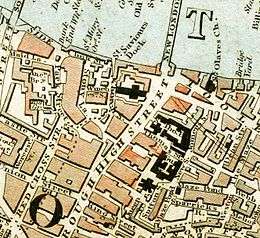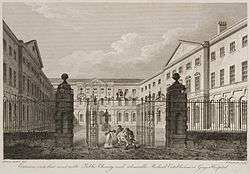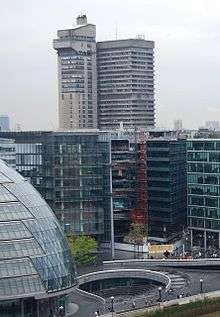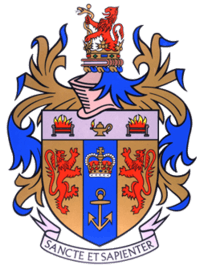Guy's Hospital
| Guy's Hospital | |
|---|---|
|
King's Health Partners Guy's and St Thomas' NHS Foundation Trust | |
 | |
| Geography | |
| Location | Southwark, London, England, United Kingdom |
| Organisation | |
| Care system | Public NHS |
| Hospital type | Teaching |
| Affiliated university | King's College London / KCLMS |
| Services | |
| Emergency department | No. A&E at St Thomas' Hospital[1] |
| Beds | 400[2] |
| History | |
| Founded | 1721 |
| Links | |
| Website |
www |
| Lists | Hospitals in England |
Guy's Hospital is a large NHS hospital in the borough of Southwark in central London. It is part of Guy's and St Thomas' NHS Foundation Trust and one of the institutions that comprise the King's Health Partners, an academic health science centre. It is a large teaching hospital and is, with St Thomas' Hospital and King's College Hospital, the location of King's College London School of Medicine (formerly known as the GKT School of Medicine). The Tower Wing (formerly known as Guy's Tower) is the world's tallest hospital building, standing at 148.65 metres (487.7 ft) with 34 floors.[3]
History

The hospital was founded in 1721 by Thomas Guy, a publisher of unlicensed Bibles who had made a fortune in the South Sea Bubble. It was originally established as a hospital to treat "incurables" discharged from St Thomas' Hospital. Guy had been a Governor and benefactor of St Thomas' and his fellow Governors supported his intention by granting the south-side of St Thomas' Street for a peppercorn rent for 999 years. Guy is interred in the crypt of the Chapel of his foundation.
Guy's has expanded over the centuries. The original buildings formed a courtyard facing St Thomas Street, comprising the hall on the east side and the Chapel, Matron's House and Surgeon's House on the west-side. Two inner quadrangles were divided by a cloister which was later restyled and dedicated to the hospital's members who fell in World War I. The east side comprised the care wards and the 'counting house' with the governors 'Burfoot Court Room'. The north-side quadrangle is dominated by a statue of Lord Nuffield who was the chairman of governors for many years and also a major benefactor. These original parts of the hospital are now administrative and social accommodation.
Despite substantial bomb damage during World War II, the original 18th century chapel remains intact including the tomb of Thomas Guy with a marble sculpture by John Bacon.
A bequest of £200,000 by William Hunt in 1829, one of the largest charitable bequests in England in historic terms, allowed for a further hundred beds to be accommodated. Hunt's name was given to the southern expansion of the hospital buildings. These were replaced c.2000 by new academic buildings for King's College, known as New Hunt's House.
In 1974, the hospital added the 34-storey Guy's Tower and 29-storey Guy's House. At 148.65 metres (487.7 ft) high, Guy's Tower (now called the Tower Wing) regained its tallest hospital building in the world status in 2014 and is currently the 21st tallest building in London. It was designed by Watkins Gray.[4]
Over 13,650 staff work in Guy's Hospital and St Thomas' Hospital. They are two of the oldest teaching hospitals, and they are situated right in the heart of the capital. One of the services that the trust provides is dental care, looking after over 120,000 patients a year.
The site

The site consists of 19 distinct, but interconnected, buildings with functions including public medical services, teaching, research and student residence. Collectively the buildings are known by local students as 'the squirrel' due to the buildings strange silhouette.
The buildings which compose the campus are:[5]

- 'Tower Wing
- Borough Wing
- Southwark Wing
- Bermondsey Wing
- Tabard Annexe
Major hospital buildings containing wards
Since the merger with St Thomas' Hospital, medical services at the Guy's site have been concentrated in the buildings to the east of Great Maze Pond:
Tower Wing

The Tower Wing was completed in 1974 and stood more than 142 metres high,[7] The tower is the tallest hospital building in the world and the tallest building in London during the 1970s. It was for six years surpassed by the Phase 3 Building of the Hong Kong Sanatorium and Hospital in Happy Valley, Hong Kong in 2008.[8] In May 2014 it regained its title following the completion of extensive repair and improvement works.[9] Guy's Tower is almost next to The Shard, the United Kingdom's tallest building. It is an example of modernist-Brutalist architecture, common at the time it was built, leaning towards the aesthetic in its slopes of its roof. A lobby occupies much of the ground floor, while most of the other floors are medical departments. A dental school is on the 17th and 18th floors and a dental department on floors 20-28. The 29th floor has a baby clinic and the 30th floor has a lecture room, which also doubles as a viewpoint.
Other buildings
The historic hospital buildings are now used by administration of the hospital and King's College. From St Thomas Street, the outer quadrangle comprises:
- Boland House - east side
- Conybeare House (containing The Chapel) - west side
- Old Guy's House - south side
The centre of Old Guy's House leads into a colonnade separating the two inner courtyards. The western courtyard has a statue of the hospital benefactor Lord Nuffield and the eastern courtyard contains an arch from the old London Bridge in which a seated statue of John Keats was recently installed.
The academic buildings of King's College are centred around the lawned area known as "The Park" or "The Quad". The premises stretch as far as Borough High Street and some buildings have names reflecting historic inns formerly on parts of the site:
- Doyles House
- Henriette Raphael House
- Hodgkin Building
- New Hunt's House
- Nuffield House
- Nuffield Nurses' Home
- Pavy Gym
- Shepherd's House
- Tabard House
- Three Tuns House
- Wolfson Centre for Age-Related Diseases
Lastly, there are a cluster of buildings to the south of New Guy's House, accessible from Snowfields and Weston Street:
- Capital House
- Munro Clinic
- Wolfson House (containing the Greenwood Theatre)
Guy's Dental Hospital
Guy's Hospital near London Bridge (5 minutes walk from the overground/underground stations) is home to the largest dental hospital in Europe. Its services include routine dentistry, dental surgery, oral medicine and specialist dentistry. In addition Guy's also provides emergency dental services, and oral and facial surgery with the majority of work being performed by students.
Dental work involves dental surgeons, as well as dental nurses, dental hygienists, dental therapists, dental technicians and medical photographers; all of which are equally important to the efficiency of the hospital's dental care services.
Developments and changes
A latest-technology-equipped Cancer Centre is being built at Guy’s Hospital. Most patients will come to the centre to have their cancer diagnosed and treated. The centre will provide specialist cancer services, training, development and research. Guy's and St Thomas's Cancer Centre has as its aim to improve cancer treatments.
On 31 October 2005 children's departments moved to the Evelina London Children's Hospital in the grounds next to St Thomas's close to the Palace of Westminster.
The Wolfson Centre for Age-Related Diseases was built following a generous donation from the Wolfson Foundation. This centre brings together research groups dedicated to improving outcomes of conditions such as Alzheimer's disease, stroke, Parkinson's disease and spinal cord injury.
To lower the cost of energy and reduce carbon emissions Guy's Hospital utilises a combined heat and power plant that operates on natural gas (methane).[10]
Notable people who worked at Guy's
- Harold Ackroyd, Victoria Cross recipient WWI
- Thomas Addison, discoverer of Addison's disease
- John Belchier, British surgeon
- William Babington, founder member of the Geological Society
- Benjamin Guy Babington invented the larygoscope
- Richard Bright, discoverer of Bright's disease
- John Butterfield, Baron Butterfield
- Sir Astley Cooper, discoverer of the Cooper's ligaments of the breasts
- Edward Cock, surgeon and nephew of Sir Astley Cooper
- Sir Alexander Fleming, discoverer of penicillin and instructor of pathology
- John Frederick France, Ophthalmic Surgeon
- Sir Alfred Downing Fripp, surgeon and knighted for his part in the reform of the R.A.M.C.
- Abraham Pineo Gesner, surgeon and inventor of kerosene refining
- Sir William Withey Gull, the first to describe myxoedema and coined the term anorexia nervosa
- John Braxton Hicks, obstetrician, discoverer of the Braxton Hicks uterine contractions
- John Hilton, great anatomist and surgeon
- James Hinton, otologist
- Thomas Hodgkin, discoverer of Hodgkin's lymphoma
- Sir Frederick Hopkins, discoverer of vitamins
- James Jurin, early work on epidemiology of the smallpox vaccine
- John Keats, poet
- Emily MacManus, Matron
- Humphry Osmond, psychiatrist who worked with psychedelic drugs and coined the term
- Frederick William Pavy, worked with Richard Bright, one of the founders and presidents of the Medical and Chirurgical Society of London
- Sir Alfred Poland, the first to describe Poland syndrome
- Philip Henry Pye-Smith, physician
- Patricia Batty Shaw, social worker
- Devi Prasad Shetty, cardiac surgeon and founder of Narayana Hrudayalaya
- Professor Keith Simpson, Home Office Pathologist
- Anthony Trafford, Baron Trafford, Conservative MP, was student and later senior registrar
- Gerard Folliott Vaughan, UK psychiatrist, who became a politician and minister of state during Margaret Thatcher's government
- Iain West, forensic pathologist
- Sir Samuel Wilks
- Ludwig Wittgenstein, worked anonymously as a hospital porter during World War II[11]
See also
- Healthcare in London
- List of hospitals in England
- King's Health Partners
- Francis Crick Institute
- Tall buildings in London
References
- ↑ http://www.guysandstthomas.nhs.uk/our-services/emergency-care/accident-and-emergency.aspx | Accident and emergency (A&E)
- ↑ "Guy's and St Thomas' NHS Foundation Trust: Vital Statistics". Archived from the original on 25 September 2007. Retrieved 4 November 2008.
- ↑ Guy's Lifts Tower regains its title as world's tallest hospital building.
- ↑ Obituary: A. Stuart Gray
- ↑ "Guy's: detail map :Campus maps :King's College London". King's College London. 28 June 2006. Retrieved 9 December 2006.
- ↑ Guy's Lifts Tower regains its title as world's tallest hospital building
- ↑ "Guys Hospital, London - Building #100". Skyscrapernews.com. Retrieved 22 April 2013.
- ↑ Minutes of 979th Meeting of the Town Planning Board held on 8.4.2011, Town Planning Board of Hong Kong Government. 8 April 2011.
- ↑ Guy's Tower regains its title as world's tallest hospital building.
- ↑ Guy's and St Thomas' Hospital CHP Plants. Clarke Energy. Retrieved 14 March 2013.
- ↑ http://www.kcl.ac.uk/aboutkings/history/flashback/porteringphilosophy.aspx
External links
| Wikimedia Commons has media related to Guy's Hospital. |
- Guy's and St Thomas' Charity
- Wolfson Centre for Age Related Diseases
- Lists of Guy's Hospital students
Coordinates: 51°30′12″N 0°05′13″W / 51.50346°N 0.08687°W
